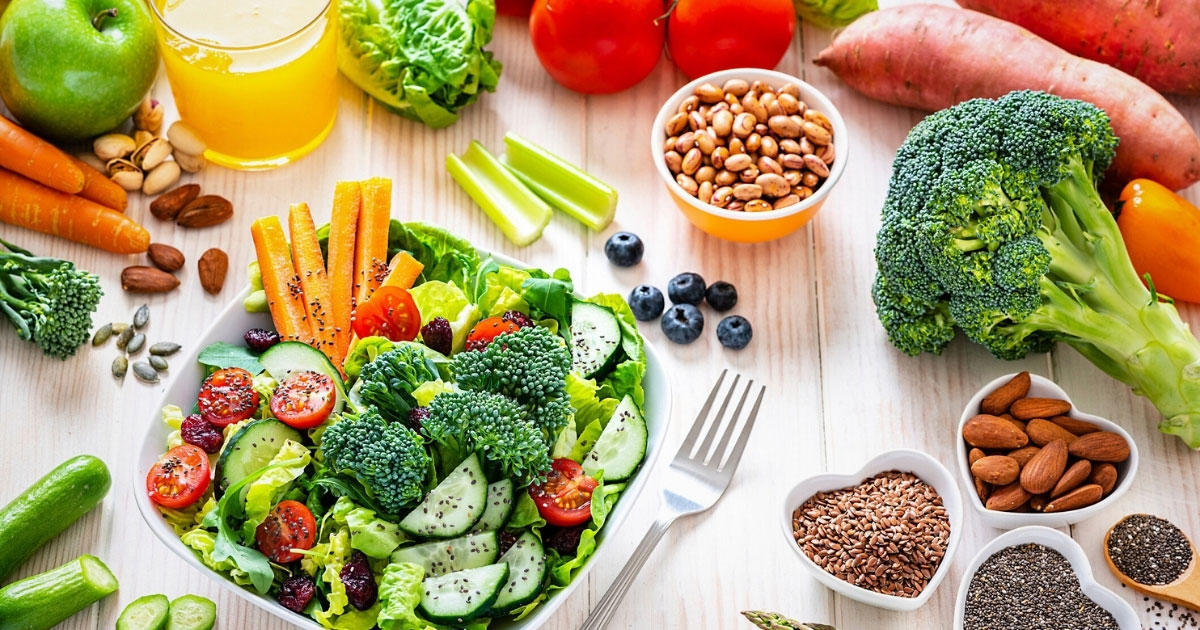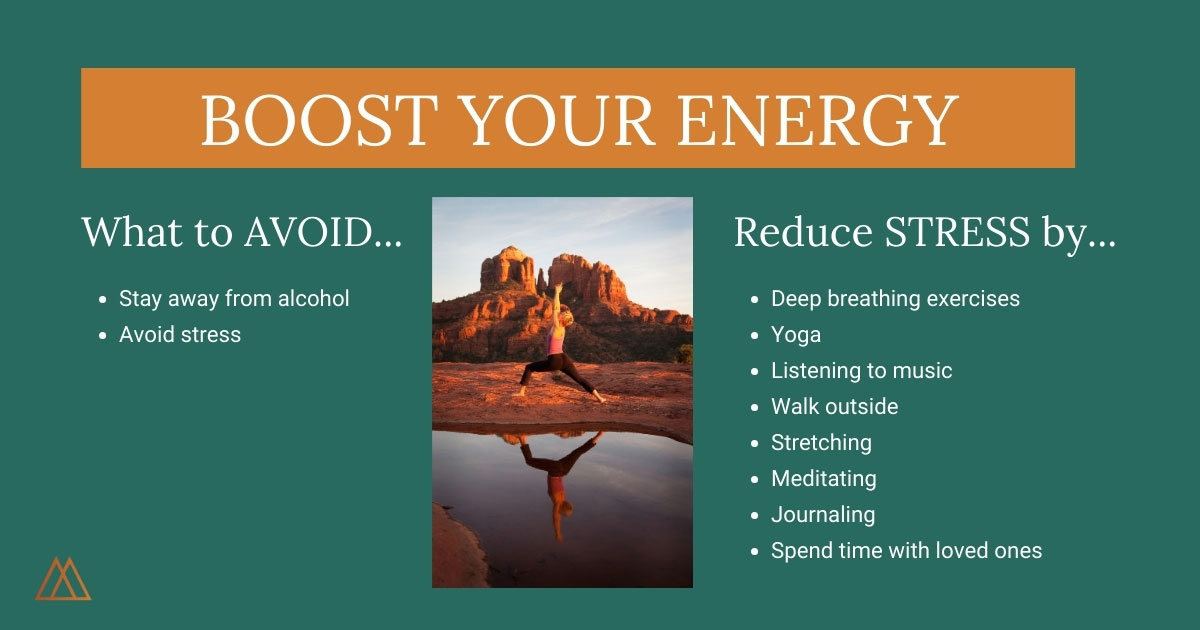1. Alsunni AA. Energy Drink Consumption: Beneficial and Adverse Health Effects. Int J Health Sci (Qassim). 2015 Oct;9(4):468-74. PMID: 26715927; PMCID: PMC4682602. [cited 2024 April 17]
2. Freeman AM, Acevedo LA, Pennings N. Insulin Resistance. 2023 Aug 17. In: StatPearls [Internet]. Treasure Island (FL): StatPearls Publishing; 2024 Jan–. PMID: 29939616. [cited 2024 April 17]
3. Cornelis M. C. (2019). The Impact of Caffeine and Coffee on Human Health. Nutrients, 11(2), 416. [cited 2024 April 17]
4. Miller, V., Bates, G., (2010). Hydration, Hydration, Hydration, The Annals of Occupational Hygiene, 54(2), 134–136 [cited 2024 April 17]
5. Wender, C. L. A., Manninen, M., & O’Connor, P. J. (2022). The Effect of Chronic Exercise on Energy and Fatigue States: A Systematic Review and Meta-Analysis of Randomized Trials. Frontiers in psychology, 13, 907637. [cited 2024 April 17]
6. Smiley, A., King, D., Bidulescu, A., (2019). The Association between Sleep Duration and Metabolic Syndrome: The NHANES 2013/2014. Nutrients, 11(11), 2582. [cited 2024 April 17]
7. Vizmanos, B., Cascales, A. I., Rodríguez-Martín, M., Salmerón, D., Morales, E., Aragón-Alonso, A., L. Scheer, A. J., & Garaulet, M. (2023). Lifestyle mediators of associations among siestas, obesity, and metabolic health. Obesity, 31(5), 1227-1239. [cited 2024 April 17]
8. Ebrahim, I. O., Shapiro, C. M., Williams, A. J., & Fenwick, P. B. (2013). Alcohol and Sleep I: Effects on Normal Sleep. Alcoholism: Clinical and Experimental Research, 37(4), 539`-549. [cited 2024 April 17]
9. Young, T., Bailey, S., Van Horn, C., Cunningham, C., (2006). Chronic ethanol consumption decreases mitochondrial and glycolytic production of ATP in liver, Alcohol and Alcoholism, 41(3), 254–260, [cited 2024 April 17]
10. Vlachos D, Malisova S, Lindberg FA, Karaniki G. Glycemic Index (GI) or Glycemic Load (GL) and Dietary Interventions for Optimizing Postprandial Hyperglycemia in Patients with T2 Diabetes: A Review. Nutrients. 2020 May 27;12(6):1561. doi: 10.3390/nu12061561. PMID: 32471238; PMCID: PMC7352659. [cited 2024 April 17]
11. Jensen GS, Ager DM, Redman KA, Mitzner MA, Benson KF, Schauss AG. Pain reduction and improvement in range of motion after daily consumption of an açai (Euterpe oleracea Mart.) pulp-fortified polyphenolic-rich fruit and berry juice blend. J Med Food. 2011 Jul-Aug;14(7-8):702-11. doi: 10.1089/jmf.2010.0150. Epub 2011 Apr 6. PMID: 21470042; PMCID: PMC3133683. [cited 2024 April 17]
12. Li YF, Chang YY, Huang HC, Wu YC, Yang MD, Chao PM. Tomato juice supplementation in young women reduces inflammatory adipokine levels independently of body fat reduction. Nutrition. 2015 May;31(5):691-6. doi: 10.1016/j.nut.2014.11.008. Epub 2014 Dec 13. PMID: 25837214. [cited 2024 April 17]
13. Kamil A, Chen CY. Health benefits of almonds beyond cholesterol reduction. J Agric Food Chem. 2012 Jul 11;60(27):6694-702. doi: 10.1021/jf2044795. Epub 2012 Feb 17. PMID: 22296169. [cited 2024 April 17]
14. Gasmi Benahmed A, Gasmi A, Arshad M, Shanaida M, Lysiuk R, Peana M, Pshyk-Titko I, Adamiv S, Shanaida Y, Bjørklund G. Health benefits of xylitol. Appl Microbiol Biotechnol. 2020 Sep;104(17):7225-7237. doi: 10.1007/s00253-020-10708-7. Epub 2020 Jul 7. PMID: 32638045. [cited 2024 April 17]
15. Ishizawa M, Uchiumi T, Takahata M, Yamaki M, Sato T. Effects of pre-bedtime blue-light exposure on ratio of deep sleep in healthy young men. Sleep Med. 2021 Aug;84:303-307. doi: 10.1016/j.sleep.2021.05.046. Epub 2021 Jun 8. PMID: 34217920. [cited 2024 April 17]
16. Maddux RE, Daukantaité D, Tellhed U. The effects of yoga on stress and psychological health among employees: an 8- and 16-week intervention study. Anxiety Stress Coping. 2018 Mar;31(2):121-134. doi: 10.1080/10615806.2017.1405261. Epub 2017 Nov 23. PMID: 29166771. [cited 2024 April 17]
17. Pascoe MC, Thompson DR, Jenkins ZM, Ski CF. Mindfulness mediates the physiological markers of stress: Systematic review and meta-analysis. J Psychiatr Res. 2017 Dec;95:156-178. doi: 10.1016/j.jpsychires.2017.08.004. Epub 2017 Aug 23. PMID: 28863392. [cited 2024 April 17]
18. Linnemann A, Ditzen B, Strahler J, Doerr JM, Nater UM. Music listening as a means of stress reduction in daily life. Psychoneuroendocrinology. 2015 Oct;60:82-90. doi: 10.1016/j.psyneuen.2015.06.008. Epub 2015 Jun 21. PMID: 26142566. [cited 2024 April 17]
19. da Silva Dias, J. C., & Imai, S. (2017). Vegetables consumption and its benefits on diabetes. Journal of Nutritional Therapeutics, 6(1), 1-0. [cited 2024 April 17]
20. Tindall, A. M., Johnston, E. A., Kris-Etherton, P. M., & Petersen, K. S. (2019). The effect of nuts on markers of glycemic control: a systematic review and meta-analysis of randomized controlled trials. The American journal of clinical nutrition, 109(2), 297-314. [cited 2024 April 17] https://doi.org/10.1093/ajcn/nqy236
21. Moosheer, S. M., Waldschütz, W., Itariu, B. K., Brath, H., & Stulnig, T. M. (2014). A protein-enriched low glycemic index diet with omega-3 polyunsaturated fatty acid supplementation exerts beneficial effects on metabolic control in type 2 diabetes. Primary care diabetes, 8(4), 308-314 [cited 2024 April 17]
22. Munsters MJ, Geraedts MC, Saris WH. Effects of different protein and glycemic index diets on metabolic profiles and substrate partitioning in lean healthy males. Appl Physiol Nutr Metab. 2013 Nov;38(11):1107-14. doi: 10.1139/apnm-2012-0409. Epub 2013 Apr 25. PMID: 24053517. [cited 2024 April 17]
23. Krajmalnik-Brown R, Ilhan ZE, Kang DW, DiBaise JK. Effects of gut microbes on nutrient absorption and energy regulation. Nutr Clin Pract. 2012 Apr;27(2):201-14. doi: 10.1177/0884533611436116. Epub 2012 Feb 24. PMID: 22367888; PMCID: PMC3601187. [cited 2024 April 17]














